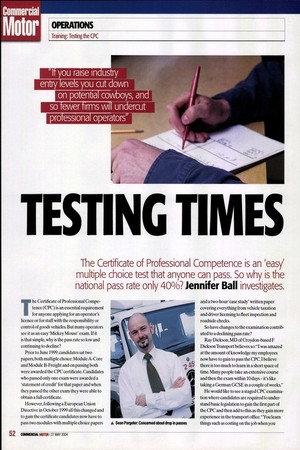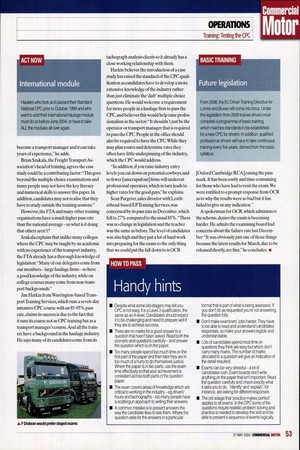TESTING TIMES
Page 54

Page 55

If you've noticed an error in this article please click here to report it so we can fix it.
The Certificate of Professional Competence is an 'easy' multiple choice test that anyone can pass. So why is the
national pass rate only 40%? Jennifer Ball investigates.
The Certificate of Professional Competence (CPC) is an essential requirement for anyone applying for an operator's licence or for staff with the responsibility or control of goods vehicles. But many operators see it as an easy 'Mickey Mouse' exam. If it is that simple, why is the pass rate so low and continuing to decline?
Prior to June 1999, candidates sat two papers, both multiple choice: Module A-Core and Module B-Freight and on passing both were awarded the CPC certificate. Candidates who passed only one exam were awarded a 'statement of credit' for that paper and when they passed the other exam they were able to obtain a full certificate. However, following a European Union Directive in October 1999 all this changed and to gain the certificate candidates now have to pass two modules with multiple choice papers
and a two-hour 'case study' written paper covering everything from vehicle taxation and driver licensing to fleet inspection and roadside checks.
So have changes to the examination contributed to a declining pass rate?
Ray Dickson, MD of Croydon-based F Dickson Transport believes so: "I was amazed at the amount of knowledge my employees now have to gain to pass the CPC. I believe there is too much to learn in a short space of time. Many people take an extensive course and then the exam within 10 days— it's like taking a German GCSE in a couple of weeks." He would like to see a staged CPC examination where candidates are required to understand basic legislation to gain the first part of the CPC and then add to this as they gain more experience in the transport office. "You learn things such as costing on the job when you
become a transport manager and it can take years of experience," he adds.
Brian Szukala, the Freight Transport Association's head of training, agrees the case study could be a contributing factor: "This goes beyond the multiple choice examinations and many people may not have the key literacy and numerical skills to answer this paper. In addition, candidates may not realise that they have to study outside the training sessions."
However, the FTA and many other training organisations have a much higher pass rate than the national average so what is it doing that others aren't?
Szukala explains that unlike many colleges where the CPC may be taught by an academic with no experience of the transport industry, the FTA already has a thorough knowledge of legislation: "Many of our delegates come from our members large haulage firms so have a good knowledge of the industry, while on college courses many come from non-transport backgrounds." Jim Harkin from Warrington-based TransportTraining Services, which runs a seven-day intensive CPC course with an 85-95% pass rate, claims its success is due to the fact that it runs its course not as CPC training but as a transport manager's course.And all the trainers have a background in the haulage industry. He says many of its candidates come from its
tachograph analysis clients so it already has a close working relationship with them.
Harkin believes the introduction of a case study has raised the standard of the CPC qualification as candidates have to develop a more extensive knowledge of the industry rather than just eliminate the 'daft' multiple choice questions. He would welcome a requirement for more people in a haulage firm to pass the CPC, and believes this would help raise professionalism in the sector:"It shouldn't just be the operator or transport manager that is required to pass the CPC. People in the office should also be required to have the CPC. While they may plan routes and determine rates they often have little underpinning of the industry, which the CPC would address. "In addition, if you raise industry entry levels you cut down on potential cowboys, and so fewer [unscrupulous] firms will undercut professional operators, which in turn leads to higher rates for the good guys," he explains Sean Pargeter, sales director with Leatherhead-based EP Training Services, was concerned by its pass rate in December, which fell to 27% compared to the usual 85%. "There was no change in legislation and the teacher was the same as before.The level of candidates was also high and they put a lot of hard work into preparing for the exam so the only thing that we could put the fall down to is OCR
[Oxford Cambridge RCA] raising the pass mark. It has been costly and time-consuming for those who have had to resit the exam. We were entitled to a prompt response from OCR as to why the results were so bad but it has failed to give us any indication." A spokesman for OCR, which administers the scheme, denies the exam is becoming harder. He admits the examining board had concerns about the failure rate last December:"It was obviously just one of those things because the latest results for March, due to be released shortly, are fine," he concludes. •
Handy hints
• Despite what some old-stagers may tell you CPC is not easy. It is a Level 3 qualification, the same as an A-level. Candidates should expect it to be challenging and need to prepare well if they are to achieve success.
• There are no marks for a good answer to a question that hasn't been asked. Read both the scenario and questions carefully and answer the question which is on the paper.
• Too many people spend too much time on the first part of the paper and then later they are in too much of a hurry to do themselves justice. Where the paper is in two parts, use the exam time effectively so that your achievement is consistent across both parts of the question paper.
• The exam covers areas of knowledge which are critical to working in the industryeg drivers' hours and tachographs -too many people have a scattergun approach to writing their answers. • A common mistake is to present answers the way the candidate likes to see them. Where the question asks for the answers in a particular
format that is part of what is being assessed. If you don't do as requested you're not answering the question fully.
II Don't make examiners' jobs harder. They have to be able to read and understand candidates' responses, so make your answers legible and understandable.
• Lots of candidates spend most time on questions they think are easy but which don't carry many marks. The number of marks allocated to a question will give an indication of the detail required.
II Exams can be very stressful a lot of candidates rush. Exam boards don't write anything on the paper that isn't important. Read the question carefully and check exactly what it asks you to do. 'Identify' and 'explain', for instance, are asking for different responses. • The old adage that 'practice makes perfect' applies to all exams. In the CPC some of the questions require realistic problem solving and practice is needed to develop this skill and be able to present a sequence of events logically International module
Hauliers who took and passed their Standard National CPC prior to October 1999 and who want to add their international haulage module must do so before June 2004, or have to take ALL the modules all over again. Future legislation
From 2006, the EU Driver Training Directive for Lorries and Buses will come into force. Under this legislation from 2009 trainee drivers must complete a programme of basic training, which matches standards to be established for a new CPC for drivers. In addition, qualified professional drivers will have to take continuous training every five years, derived from the basic syllabus.






























































































































































































